Abstract
In recent years, Image Deblurring techniques have played an essential role in the field of Image Processing. In image deblurring, there are several kinds of blurred image such as motion blur, defocused blur and gaussian blur. Many methods to address this problem have been proposed by researchers in previous research, among which the iterative blind deconvolution (IBD) method is the most popular method to solve this problem. However, the convergence of this method is not ensured, and there is no effective method to choose a proper initial estimate image and PSF(point spread function). In this paper, we improve the iterative blind deconvolution method by adding several constraints, which could be the type or parameters range of the PSF, on the PSF in each iteration. Experiment results validate that, with the help of these newly added constraints, our method are more likely to converge and has better deblurring performance than the IBD.
Preview
Unable to display preview. Download preview PDF.
Similar content being viewed by others
References
Katsaggelos, A.K.: Digital Image Restoration. Springer Series in Information Science. Springer, Berlin (1991)
Andrews, H.C., Hunt, B.R.: Digital Image Restoration. Prentice-Hall Signal Processing Series. Prentice-Hall, Englewood Cliffs (1977)
Kundur, D., Hatzinakos, D.: Blind image deconvolution revisited. IEEE Signal Processing Mag. 13, 43–64 (1996)
Fu, S.Y., Zhang, Y.C., Cheng, L., Liang, Z.Z., Hou, Z.G., Tan, M.: Motion Based Image Deblur Using Recurrent Neural Network for Power Transmission Line Inspection Robot. In: International Joint Conference on Neural Networks, IJCNN 2006, pp. 3854–3859 (2006)
Ayers, G.R., Dainty, J.C.: Iterative blind deconvolution method and its applications. Optics Letters 13, 547–549 (1988)
Davey, B.L.K., Lane, R.G., Bates, R.H.T.: Blind deconvolution of a noisy complex-valued image. Optics Communications 69, 353–356 (1989)
Miura, N., Baba, N.: Extended-object reconstruction with sequential use of the iterative blind deconvolution method. Optics Communications 89, 375–379 (1992)
Tsumuraya, F., Miura, N., Baba, N.: Iterative blind deconvolution method using Lucys algorithm. Astron Astrophys. 282, 699–708 (1994)
Miura, N., Ohsawa, K., Baba, N.: Single -frame blind deconvolution by means of frame segmentation. Optics Letters 19, 695–697 (1994)
Thibaut, E., Conan, J.: Strict a priori constraints for maximum-likelihood blind deconvolution. Journal of the Optical Society of America A (1995)
Biemond, J., Lagendijk, R.L., Mersereau, R.M.: Iterative methods for image deblurring. Proc IEEE 78, 856–883 (1990)
Money, J.H., Kang, S.H.: Total variation minimizing blind deconvolution with shock filter reference. Image and Vision Comput. 26, 302–314 (2008)
Prasath, V.B.S., Singh, A.: Ringing artifact reduction in blind image deblurring and denoising problems by regularization methods. In: Seventh International Conference on Advances in Pattern Recognition (2009)
Carasso, A.: Direct blind deconvolution. SIAM Journal on Applied Mathematics 61, 1980–2007 (2001)
Liang, X.B., Wang, J.: A recurrent neural network for nonlinear optimization with a continuously differentiable objective function and bound constraints. IEEE Transactions on Neural Networks 11, 1251–1262 (2000)
Rekleitis, I.M.: Optical Flow Recognition From The Power Spectrum of A Single Blurred Image. In: Image Processing, 1996. Proceedings, International Conference, vol. 3, pp. 791–794 (1996)
Yang, Y., Galatsanos, N.P., Stark, H.: Projection-based blind deconvolution. Journal of the Optical Society of America 11, 2401–2409 (1994)
Author information
Authors and Affiliations
Editor information
Editors and Affiliations
Rights and permissions
Copyright information
© 2010 Springer-Verlag Berlin Heidelberg
About this paper
Cite this paper
Mo, X., Jiao, J., Shen, C. (2010). PSF-Constraints Based Iterative Blind Deconvolution Method for Image Deblurring. In: Boll, S., Tian, Q., Zhang, L., Zhang, Z., Chen, YP.P. (eds) Advances in Multimedia Modeling. MMM 2010. Lecture Notes in Computer Science, vol 5916. Springer, Berlin, Heidelberg. https://doi.org/10.1007/978-3-642-11301-7_17
Download citation
DOI: https://doi.org/10.1007/978-3-642-11301-7_17
Publisher Name: Springer, Berlin, Heidelberg
Print ISBN: 978-3-642-11300-0
Online ISBN: 978-3-642-11301-7
eBook Packages: Computer ScienceComputer Science (R0)




